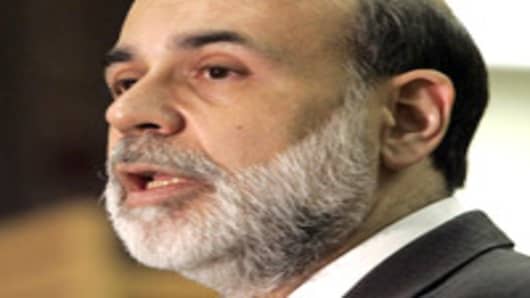Bernanke again pledged to aggressively slash a key interest rate as needed to bolster an economy that is weakening under the strains of a severe housing slump and credit crisis.
Many economists believe the Fed will lower its key rate, now at 4.25 percent, by a bold half-percentage point at its next meeting on Jan. 30. The Fed cut rates three times last year, starting in September. But some critics on Wall Street and elsewhere have been critical of Bernanke for not taking action sooner and more forcefully.
"We stand ready to take substantive additional action as needed to support growth and to provide adequate insurance against downside risks," Bernanke told the budget panel Thursday, echoing the same--and unusually frank--language he used last week to signal the Fed's next move.
Although Republicans and Democrats differ over what provisions should be part of any economic stimulus package, there's widespread agreement that tax rebates along the lines of the $300-$600 checks provided in 2001 are likely to be part of the measure. The country last suffered a recession in 2001.
"To be useful, a fiscal stimulus package should be implemented quickly and structured so that its effects on aggregate spending are felt as much as possible within the next 12 months or so," Bernanke told lawmakers. The notion behind the rebates, for instance, is to get money into the hands of consumers quickly so that they boost spending, helping energize the national economy.
"Stimulus that comes too late will not help support economic activity in the near term, and it could be actively destabilizing if it comes at a time when growth is already improving," Bernanke said. "Thus, fiscal measures that involve long lead times or result in additional economic activity only over a protracted period, whatever their intrinsic merits might be, will not provide stimulus when it is most needed," he added.
Moreover, Bernanke said any fiscal package should also be "efficient in the sense of maximizing the amount of near-term stimulus per dollar of increased federal expenditure or lost revenue," he said.
Any such package also must be temporary to avoid making a big boost to the federal government's budget deficits and adding to the country's long-term fiscal burdens.
"The nation faces daunting long-run budget challenges associated with an aging population, rising health care costs and other factors. A fiscal program that increased the structural budget deficit would only make confronting those challenges more difficult," Bernanke warned.
Before Bernanke spoke, there was yet more downbeat economic and financial news.
New-home building plunged last year by 24.8 percent, the biggest drop in 27 years, the Commerce Department reported Thursday morning. It provided stark evidence of the toll of the deep housing slump.
Financial companies, meanwhile, hard hit by the housing and credit crises, continue to wrack up multibillion losses. Merrill Lynch, the world's largest brokerage, said Thursday it posted a fourth-quarter loss of nearly $10 billionafter writing down some $14.6 billion worth of investments and trades slammed by the ongoing credit crisis.
Those reports join a recent string of dismal economic reports has raised fears the country could slide into a recession this year. Retail sales have plunged. The nation's unemployment rate has jumped from 4.7 percent to 5 percent, a two-year high. Manufacturing activity has slowed. The nation's major banks are piling up big losses and Wall Street has been mired in turmoil.


